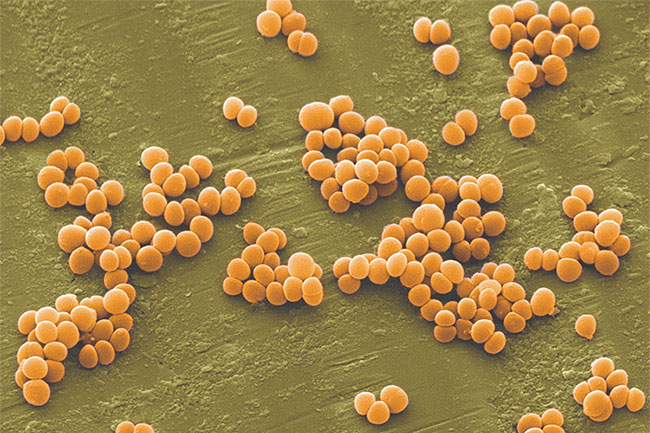How does golden staph bacteria enter through dangerous food?
According to the Vietnam Institute of Applied Medicine, staphylococcus (Staphylococcus) is a strain of bacteria present in many places in the natural environment, the most common is golden staph.
Under normal conditions they do not cause illness, but when the bacteria enter the body, through skin, respiratory, and digestive wounds . they can cause very serious infections such as: sores, cellulitis on the skin; Osteomyelitis, pneumonia, even when they enter the blood can become septic shock or multiorgan failure and lead to death.
Everyone can be poisoned when eating food contaminated with golden staph.Foods most susceptible to golden staph are : Eggs, cattle and poultry meat, salads (eggs, tuna, chicken, potatoes, pasta), creamy pastries, products from milk…
The source of infection with golden staph can be caused by cooking utensils, food processing, or hygiene, due to poor selection, processing and preservation of food.

Everyone can be poisoned when eating food contaminated with golden staph.
Symptoms of staph infection
- Vomiting caused by bacteria to release toxins into food makes people sick.
- The patient may have a fever.
- Severe cases may result in diarrhea and dizziness.
How to prevent staph infection
There is currently no specific vaccine for prevention of diseases caused by staphylococcus aureus. However, people can apply the following measures to prevent spread of bacteria:
- When infected on the skin, cover the skin with a clean, dry bandage. Keep clean, wash your hands in accordance with the instructions, avoid close contact with infected people, need to clean scratches, cuts and wounds on the skin to minimize the risk of golden staph infiltration through open wounds this.
It is necessary to follow the rules of processing and processing safe food to prevent the risk of poisoning caused by staph.
- Wash your hands thoroughly with soap and water before preparing food.
- If there are wounds, skin infections, or eye and nose infections, do not prepare food for others.
- Cleaning and sterilizing kitchens and dining areas.
When cooking, ensure high temperatures above 60 degrees Celsius and store cold food below 4 degrees Celsius.
Foods that need to be refrigerated should be refrigerated as soon as possible.
- The most toxic and strange forms of bacteria on the planet
- Potential risk from carrying food
- Golden bridge - 'defending champion' antibiotic resistance
- From milk from the Tasmanian devil to super antibiotic
- New staph can cause death in 72 hours
- Drug resistance of the virus
- Birth control pills increase staph infection
- Signs of staph infection anyone should not be ignored
- Vitamin B3 can help kill viruses
- Video: Risks to the body when stabbed or thorny
- The fungi and bacteria that follow shoes enter the house
- Deadly bacteria in chicken can resist antibiotics
 Why do potatoes have eyes?
Why do potatoes have eyes? 'Tragedy' the world's largest carnivorous life: Death becomes ... public toilet
'Tragedy' the world's largest carnivorous life: Death becomes ... public toilet Tomatoes were once considered 'poisonous' for 200 years
Tomatoes were once considered 'poisonous' for 200 years Detecting microscopic parasites on human face
Detecting microscopic parasites on human face